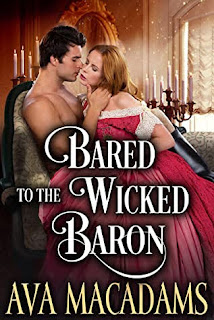Weekly Reader: Bared To The Wicked Baron by Ava McAdams; Captivating Regency Romance But With A Very Misleading Title
By Julie Sara Porter
Bookworm Reviews
Spoilers: In the Romance genre, certain things sell and are as omnipresent as scary things are to a Stephen King novel. Sex sells as shown by the covers featuring barely dressed lovers wrapped in each other's arms. Certain time periods sell as shown by the glut of historical romances, particularly during the Regency Era. Certain words in the title, like "Wicked," Naughty," "Forbidden," "Sinful," and "Passion," sell as well. Those words reveal something dark and forbidden about the romance that Readers are about to indulge into. It's a business decision, but at times it is an unnecessary one especially when the title is extraordinarily misleading.
Take Ava McAdams' novel Bared To The Wicked Baron. It would be a halfway decent Regency era Romance of a couple getting to know each other despite outside forces attempting to break them up.
However the title Bared To The Wicked Baron suggests something else. It suggests something more salacious and sultrier than what we get and it seems to do so only to sell the book to more Readers.
The titular Baron is nowhere near wicked. Sir Phillip Andrews, The Baron of Havordshire, is actually a sweet, but private baron who is caring for his ailing mother. He has been steadily losing money and now resides in a humble cottage to care for her. He has a few loyal servants, but he does much of the nursing himself. Because of this, he doesn't have a lot of time to do the usual social routine of a man among the ton. His friends convince him to spend one night away at a ball so he can finally relax. Now does this sound remotely wicked to you?
He is not wicked in temperament nor in reputation. I could sort of understand if Phillip harbored a reputation of being wicked to ward women away from him so they, and the Reader, don't know that he is caring for his mother leaving his family problems to be a surprise. Perhaps it could be the hidden heart inside his Byronic reputation. But his family conflict is revealed in the second chapter. No one describes or refers to Phillip as wicked and he never behaves that way. Arthur Thistlewood from The Second Mrs. Thistlewood has more right to the adjective than Phillip does. At most Phillip could be private, maybe secretive. Were Bared To The Private or Secretive Baron taken as titles?
Because he has been AWOL from social duties, Phillip's friends warn that his time may be up pursuing young viable women to be brides and give birth to his heirs without looking like an aging fool. Another character running out of time is Helena, daughter of the Earl of Brimsey. She is 27 years old and missed an earlier Season, because of her family's dwindled finances. Now her parents say better late than never and she needs to be married before it's too late. Naturally she goes to the same ball in which Phillip is dragged. The two meet, share a dance, and begin to fall in love.
Their courtship is rushed. That could be attributed to their ages in a time period where they were expected to already be married and the implied anxiety that would happen in a time period where death in childbirth is far from unheard, when late in life pregnancies can produce many long term complications, and when the medical profession amounted to guesswork. Helena and Phillip's courtship is steamy in that it's an emotional release for a long delayed dream, one that satisfies them on a personal level. They are a nice decent couple that couldn't be further from villainous if they tried.
There is a wicked character in the book that complicates Helena and Phillip's courtship. They use underhanded means to come between the couple like physical attacks and secret confidences. More cannot be revealed but that person is definitely not a baron. This character has some development but it is revealed too late since they are unbearable and annoying throughout. In fact, their villainy is pretty transparent and certainly not compelling.
Bared To The Wicked Baron is a decent romance but it promises to be something else. With so many words that could have been chosen for the title, wicked should not have been one of them.



